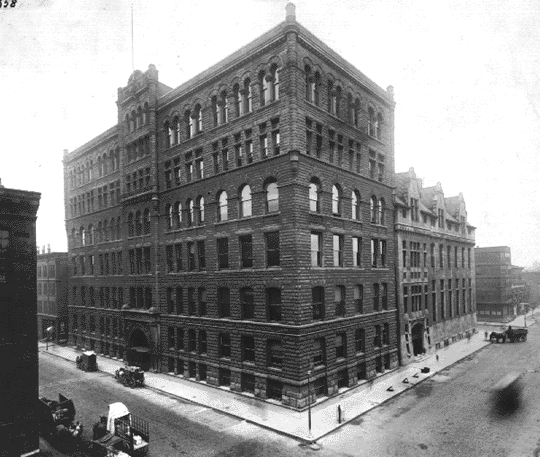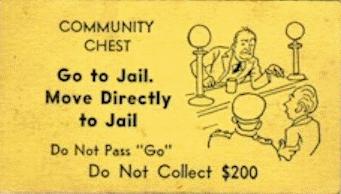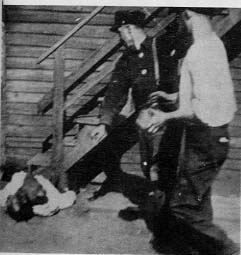Law Enforcement of Chicago
The Cook County Criminal Courts were housed in this building for 35 years.This building was the site of some of the most infamous murder trials of Chicago, including the Leopold and Loeb murder trial alluded to in Native Son.
(City of Chicago, 2004)

Law enforcement during the 1940s was a direct statement that all men were not created equal. The legal proceedings brought about for white people were inarguably unfair compared to those for blacks.
Innocent blacks were accused of countless crimes, simply because of their skin color. If a black man did one crime, it was certain that he would be faced with several more allegations. In Native Son, Bigger admits to killing Mary Dalton, but he is no rapist. He tries to tell his lawyer, a white man named Mr. Max, why he feels that his situation is hopeless.
'Did you rape her, Bigger?'
'Naw, Mr. Max. I didn't. But nobody'll believe me. '
'Had you planned to before Mrs. Dalton came into the room?'
Bigger shook his head and rubbed his hands nervously across his eyes.
'Oh, I don't know. I was feeling a little that way... I was drunk and she was drunk and I was feeling a little that way. '
'..But, did you rape her?'
'Naw. But everybody'll say I did. What's the use? I'm black. They say black men do that. So it don't matter if I did or didn't.' 10
There is no evidence to prove that Bigger raped Mary. The police are making an accusation based on a racial stereotype. Because racial stereotyping was so powerful in the 1940s, Bigger knows that he will be just another black man fallen victim to racial profiling. Regardless of his account of the incident, in 1940s Chicago, the idea of a white person was taken to be more legitimate than the testimony of a black.
You have just been accused of the rape of a wealthy, white male or female!
Select your plea...
Guilty *.*.* or *.*.* Not Guilty

For Bigger, life was a Community Chest card, except that his said "You are a rapist. Go to the Electric chair. Move directly to the Electric chair. Do not pass 'Go.' Do not collect $200." (Anonymous Webmaster, 2004)
In conjunction with the accusations, the actual court proceedings of the decade were the direct opposite of a fair jury trial. Angry, white mobs frequently stormed the city streets, searching for criminals on their own. If the mob found a black criminal before the police did, they would savagely toture and beat him. If the police found the criminal first, the mobs would often rip black defendants from the arms of the police officers and pummel and lynch him. "Torture was routinely used, often over several days, to get 'voluntary' confessions that led to sentences of death. State courts gave no protection at all to the victims of these practices." 11 The ordeal the Bigger faced upon being caught touches on mob interference, but avoids graphic nature.
He was near the street; he could hear shouts and screams coming to him like the roar of water....
"Kill 'im!"
"Lynch him!"
"That black sonofabitch!"
...He opened his eyes a little and saw an array of faces, white and looming.
"Kill that black ape!"
Two men stretched his arms out, as though about to crucify him; they placed a foot on each of his wrists, making them sink down in the snow. His eyes closed, slowly, and he was swallowed in darkness." 12
The mob forcefully attacks Bigger, both verbally and physically, for raping Mary Dalton. Bigger feels that he has fallen victim to the fury of the mob much like Jesus fell victim to the violence of a mob. Though he is far from religious, Bigger relates himself to Jesus; he feels that they both were wrongfully accused and beaten for a crime that they did not commit. Like Jesus, when the mob storms Bigger, the only thing that he can do is lie back and let the mob maul him.
"White gangs stone to death a Black man during the 1919 race riots. Segregation, racist violence, and theghetto have decisively shaped Chicago's gang experience." (Hagedorn, 2004)

As if lynching an innocent man is not enough, the mobs would oftentimes riot outside courthouses while the trial was in session in an attempt to frighten the jurors into a guilty verdict. Unfortunately, their attempts usually worked; Bigger's jury trial is a prime example of the control that white mobs had over the judicial system. The county prosecutor, Buckley, uses the mob outside as leverage in his final plea.
'...Your honor, millions are waiting for your word! They are waiting for you to tell them that jungle law does not prevail in this city! They want you to tell them that they need not sharpen their knives and load their guns to protect themselves. Give them word so that they can, with calm hearts, plan for the future!"13
Between the rumblings heard inside the courthouse and Buckley's descriptions of mob members carrying weapons, the jurors are compelled to vote "guilty". If they do not, there will be complete chaos outside. The mob will, in all probability, take over, slaying Bigger and anyone who protests. The mob has convicted Bigger before he ever sets foot into a courtroom.
In 1940s Chicago, this appalling behavior was a reality. Much like the Salem Witch Trials, blacks were seemingly condemned from the day that they were born. If they got into even a small amount of trouble, the allegations and fury against them built up in a never-ending black hole of hatred. All humanity was stripped from the blacks, leaving many with only a wish that they were born white.